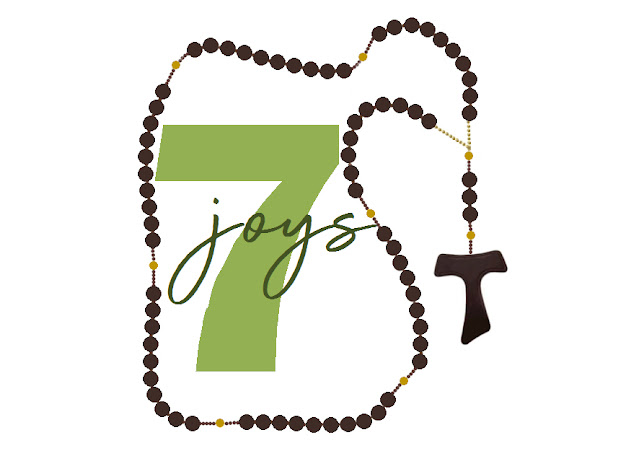Franciscan Crown
AUGUST 27: FEAST OF THE 7 JOYS OF MARY
Devotion of the Seraphic Order
The Franciscan Crown (or Seraphic Rosary) is a rosary consisting of seven decennaries in commemoration of the Seven Joys of the Virgin, namely, the Annunciation, the Visitation, the Nativity of Jesus, the Adoration of the Wise men, the Finding in the Temple, the Resurrection of Christ, and finally, either or both the Assumption of Mary and the Coronation of the Virgin. Devotion to the seven joys of Mary is found in a variety of forms and communities. This devotion was granted many indulgences by different Popes, becoming one of the most heavily indulgenced devotion in the Church.
The Franciscan Crown has been called the Franciscan Rosary, the Seraphic Rosary or the Rosary of the Seven Joys of Our Lady. They recall seven joyful episodes in the life of the Blessed Virgin Mary. The practice originated among the Franciscans in early 15th-century Italy. The themes resemble the 12th-century Gaudes, Latin praises that ask Mary to rejoice because God has favored her in various ways.
The Franciscan historian, Father Luke Wadding (1588-1657) dates the origin of the Franciscan Crown to the year 1422. In 1422 an apparition of the Blessed Virgin Mary took place in Assisi, to a Franciscan novice named James. As a child, he had the custom of offering daily the Virgin Mary a crown of roses. When he entered the Friars Minor, he became distressed that he would no longer be able to offer this gift. The Blessed Virgin appeared to him to give him comfort and showed him another daily offering that he might do: to pray every day seven decades of Hail Marys, meditating between each decade on one of the seven joys that she had experienced in her life.
The Franciscan Crown has been called the Franciscan Rosary, the Seraphic Rosary or the Rosary of the Seven Joys of Our Lady. They recall seven joyful episodes in the life of the Blessed Virgin Mary. The practice originated among the Franciscans in early 15th-century Italy. The themes resemble the 12th-century Gaudes, Latin praises that ask Mary to rejoice because God has favored her in various ways.
The Franciscan historian, Father Luke Wadding (1588-1657) dates the origin of the Franciscan Crown to the year 1422. In 1422 an apparition of the Blessed Virgin Mary took place in Assisi, to a Franciscan novice named James. As a child, he had the custom of offering daily the Virgin Mary a crown of roses. When he entered the Friars Minor, he became distressed that he would no longer be able to offer this gift. The Blessed Virgin appeared to him to give him comfort and showed him another daily offering that he might do: to pray every day seven decades of Hail Marys, meditating between each decade on one of the seven joys that she had experienced in her life.
This image is a public domain image, which means either that copyright has expired in the image or the copyright holder has waived their copyright. Franciscan Gallery charges for the access to high resolution copy of the image. Manually restoration was necessary in order to improve quality, without covering the original image.







Comments
Post a Comment